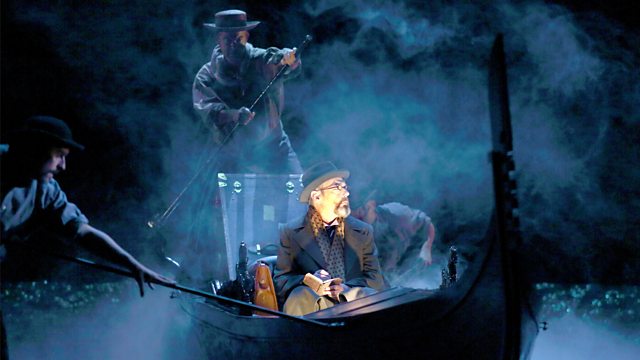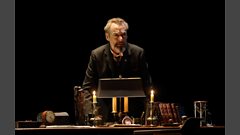
Death in Venice
Death in Venice from the Royal Opera House, Covent Garden. Kate Molleson presents and is joined in the box by Dr Lucy Walker to discuss Britten's late great opera.
Britten's final opera in a new production from the Royal Opera House, Covent Garden. Based on a novella by Thomas Mann. The German writer Gustav von Aschenbach travels to Venice in search of creative inspiration, but his thoughts are distracted by a beautiful Polish youth, with whom he becomes obsessed. Mark Padmore sings the troubled writer, and Gerald Finley the seven characters who appear throughout the opera to lead him to his eventual demise. Kate Molleson presents and is joined in the box by Dr Lucy Walker from the Britten-Pears Foundation to discuss Britten's late great opera.
Britten: Death in Venice
Gustav von Ashenbach ..... Mark Padmore (tenor)
Traveller/Old Gondolier/Hotel Manager/Elderly Fop/Hotel Barber/Leader of Players/Voice of Dionysus ..... Gerald Finley (bass-baritone)
Voice of Apollo ..... Randall Scotting (countertenor)
Strawberry Seller ..... Rebecca Evans (soprano)
Lace Seller ..... Masabane Cecilia Rangwanasha (soprano)
Danish Lady ..... Elizabeth Weisberg (soprano)
English Lady ..... Katy Batho (soprano)
Russian Nanny ..... Rosie Aldridge (mezzo-soprano)
German Mother ..... Hanna Hipp (mezzo-soprano)
Russian Spinster ..... Amanda Baldwin (mezzo-soprano)_
French Mother ..... Rebecca Lodge Birkebaek (mezzo-soprano)
Hotel Porter ..... Colin Judson (tenor)
Boy Player ..... Andrew Tortise (tenor)
Glass Maker ..... Sam Furness (tenor)
Steward ..... Andrew O'Connor (tenor)
English Clerk ..... Dominic Sedgwick (baritone)
German Father ..... Michael Mofidian (bass-baritone)
Lido Boatman ..... ByeonMin Gil (bass-baritone)
Russian Father ..... Dominic Barrand (bass-baritone)
Chorus and Orchestra of Royal Opera House
Richard Farnes (conductor)
Last on
More episodes
Music Played
-
![]()
Benjamin Britten
Death In Venice Act I
Singer: Mark Padmore. Singer: Gerald Finley. Orchestra: Orchestra of the Royal Opera House, Covent Garden. Conductor: Richard Farnes. -
![]()
Benjamin Britten
Death In Venice Act II
Singer: Mark Padmore. Singer: Gerald Finley. Orchestra: Orchestra of the Royal Opera House, Covent Garden. Conductor: Richard Farnes. -
![]()
Richard Strauss
Horn Concerto no.1 in E flat major Op.11
Performer: David Pyatt. Orchestra: Britten Sinfonia. Conductor: Nicholas Cleobury.- EMI.
Synopsis
The action is set in Germany and Venice in 1911
��
Act I
Scene 1: Munich
The celebrated German writer Gustav von Aschenbach is ageing, his creative faculties exhausted. Walking through a cemetery he encounters a mysterious Traveller from beyond the Alps who awakens a strange longing within him to journey south. He decides to visit Venice once more.
��
Scene 2: On the boat to Venice
Aschenbach shares passage with a rowdy group of young men and an Elderly Fop, whose heavy make-up and familiar manner revolt him. As Aschenbach tries to disembark, the Fop sends his regards to the sweetheart awaiting Aschenbach in Venice.
��
Overture: Venice
Scene 3: The journey to the Lido
Aschenbach is rowed across the lagoon by a surly old Gondolier who refuses to take him in the direction he wants to go. Having reached the landing stage, the Gondolier vanishes without taking payment.
��
Scene 4: The first evening at the hotel
The Hotel Manager welcomes Aschenbach as a distinguished and famous guest. Aschenbach settles into his room but has been shaken by his journey to Venice. He descends for dinner, where the hotel guests are gathering in the salon. Last to enter are a Governess and a family who Aschenbach guesses to be from Poland. He is struck by the beauty of the son. Their mother, the Lady of the Pearls, takes them in to dinner, leaving Aschenbach pondering the nature of beauty.
��
Scene 5: On the beach
Aschenbach wonders if he has made the right decision in travelling to Venice after all. As the children of the hotel guests play on the sand, a Strawberry Seller wanders across the beach and Aschenbach buys some fruit from her. As he makes up his mind to stay, the Polish boy comes into view. Aschenbach is again enchanted by his appearance and tries to discern the name his family call him, realizing at last that it is ‘Tadzio’. Watching Tadzio and his friend Jaschiu play together, Aschenbach is strangely thrilled when Tadzio returns his gaze.
��
Scene 6: The foiled departure
Aschenbach takes a gondola across the lagoon to the city of Venice but is stifled by the oppressive air in the narrow streets and repelled by the hawkers and beggars who descend upon him. He resolves to leave Venice after all and returns to the hotel. The Hotel Manager arranges for his luggage to be sent ahead to the train station. Aschenbach feels a pang of regret at his departure when Tadzio passes by. On his arrival at the station, the Hotel Porter tells him his luggage has been misdirected to Como instead of Munich. Aschenbach refuses to leave until his belongings are returned and sets off once more to the hotel. Seeing Tadzio on the beach, Aschenbach realizes that he is overjoyed to be detained in Venice and resolves to give up his days to pleasure.
��
Scene 7: The Games of Apollo
As the sun-drenched days pass, Aschenbach’s imagination is newly inspired by the contemplation of Tadzio. As he watches him play with his friends on the sand, his mind is filled with images of the Olympian games of Classical Greece, presided over by the sun-god Apollo. He resolves to break his silence and talk to Tadzio but finds himself unable to when the opportunity arises. Tadzio smiles at him and Aschenbach realizes the nature of his feelings; he confesses them to himself with the words ‘I love you’.
��
��
Act II
Scene 8: The Hotel Barber’s Shop, 1
Aschenbach tries to rationalize his emotions, accepting that his confession of love must be allowed to stand. He visits the shop of the prattling Hotel Barber, who lets slip a rumour about an incipient illness in Venice. When Aschenbach questions him, he quickly changes the subject.
��
Scene 9: The pursuit
Aschenbach crosses to Venice again and is immediately struck by the smell of disinfectant in the streets. Some citizens are gathered around a public notice advising extra health precautions but, when questioned by Aschenbach, deny anything serious is afoot. He buys a German newspaper in search of information and finds an article warning visitors of a cholera outbreak in Venice. Almost immediately Tadzio and his family come into view and Aschenbach, terrified that their holiday might be cut short, determines that the truth should be hidden from them. He begins to follow the family through the streets of Venice, anxious yet thrilled whenever Tadzio looks back in his direction. As the days pass,Aschenbach becomes totally consumed by his obsession.
Scene 10: The Strolling Players
Some strolling players visit the terrace of the hotel to entertain the guests after dinner. Aschenbach presses their Leader for information about the sickness in Venice but he denies anything of the kind. The Leader sings a ribald ����street song that soon has all the guests in gales of laughter. Only Aschenbach and Tadzio are silent.
��
Scene 11: The travel bureau
Aschenbach visits a travel bureau in search of information. Several tourists are desperately trying to buy tickets to escape Venice. Aschenbach questions the young Clerk in charge, who reveals the whole truth to him. He tells him that Venice is fully in the grip of a cholera epidemic that will soon cause a blockade. He warns Aschenbach to leave the city immediately.
��
Scene 12: The Lady of the Pearls
Aschenbach attempts to warn Tadzio’s mother of the danger but when she looks at him inquiringly he is tongue-tied once more and says nothing.
��
Scene 13: The dream
Asleep in his hotel room, Aschenbach has a terrifying dream. The gods Apollo and Dionysus battle for possession of him, with the dark god of chaos triumphant. The followers of Dionysus swarm around him in a frenzied dance. Aschenbach suddenly awakes, fully aware of the erotic nature of his feelings for Tadzio.
��
Scene 14: The empty beach
As more and more guests leave the hotel, the remaining children play a desultory game on the sands.
��
Scene 15: The Hotel Barber’s shop 2
Eager to please, Aschenbach allows the Barber to transform his appearance with hair-dye and make-up. A mirror image of the Elderly Fop who so revolted him on the boat to Venice, Aschenbach sets off in pursuit of Tadzio once more.
��
Scene 16: The last visit to Venice
Aschenbach tries to follow the family through the streets but he is gasping for breath and loses sight of them. Exhausted, he buys some fruit from the Strawberry Seller but the strawberries are over-ripe and rotten. He collapses in a street corner. He recites some lines to himself, from Socrates’ discourse on love and beauty, Phaedrus. But the philosopher’s words no longer bring him comfort or resolution. He slowly heads back to the hotel.
��
Scene 17: The departure
The Hotel Manager bemoans the departure of so many guests from the hotel as the Porter brings down yet more luggage. Aschenbach enters the lobby and is told that the Polish family will depart after luncheon. The Manager inquires whether Aschenbach himself will not soon be leaving. Aschenbach goes out to the beach and sees Tadzio at play with Jaschiu, but the game soon becomes rough and aggressive, ending with Jaschiu shoving Tadzio’s face into the sand. He runs off leaving Tadzio alone. Watched only by Aschenbach, Tadzio wanders towards the sea and then turns with a gesture that seems to summon Aschenbach towards the horizon. Aschenbach dies.
��
David McVicar
Broadcast
- Sat 28 Dec 2019 18:30�鶹������ҳ��� Radio 3


